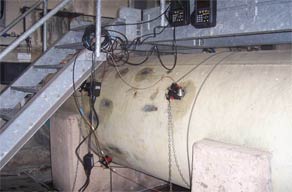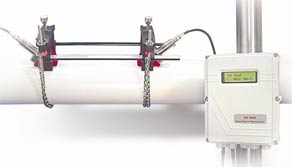Large Diameter Pipe Flow Measurement: 2000mm Pipeline
Abstract
2000mm in diameter, flow up to 22,000 litres a second, 7.0m/sec and producing 3 MegaWatts of electricity, that was the challenge for one of RS Hydro's clamp on ultrasonic flow meters. Many companies can claim that they can measure 600mm and perhaps 1000mm diameter pipes but there are few who can consistently provide accurate flow data when the pressure is on.
Equipment Used
Panametrics PT878 and dual channel AT868.
The Solution
Setup was achieved within 15 minutes! Standing next to a pipe with a flow rate of over 20 tonnes per second with a pressure of over 30 bar is quite a humbling experience, especially when this volume of water is only 12mm of steel and a bitumen liner away from your existence.
RS Hydro was asked to achieve two objectives:
- To establish the efficiency of the turbine drives.
- To prove that a clamp on ultrasonic flow meter could be retrofitted to this pipe to provide an immediate alarm should there be a burst.
 RS Hydro used the Panametrics PT878 to measure the in-situ flow rate of the two 2000mm diameter pipes using the renowned CRS402 transducers with magnetic clamps. Imagine the scenario - a large pipe and a conventional clamp on flow meter with 2 sets of 8m chains per transducer. Then try wrapping these around a pipe which is 1m off the ground and at 45 degrees to the vertical. Now is the time to sprout wings. Well, not if you have the PT878 flow meter. RS Hydro supply magnetic clamps which allow you to clamp the transducers to any metallic pipe, regardless of coatings. The transducers were attached in less than ten minutes, followed by cables. The flow meter was programmed in just a few more minutes and our engineer was measuring and logging the in-situ flow rate without any shutdown. The engineer
was then able to attach energy inputs from the power station to measure and hence establish the most economical setpoint per unit of water for each turbine and establish any issues with performance.
RS Hydro used the Panametrics PT878 to measure the in-situ flow rate of the two 2000mm diameter pipes using the renowned CRS402 transducers with magnetic clamps. Imagine the scenario - a large pipe and a conventional clamp on flow meter with 2 sets of 8m chains per transducer. Then try wrapping these around a pipe which is 1m off the ground and at 45 degrees to the vertical. Now is the time to sprout wings. Well, not if you have the PT878 flow meter. RS Hydro supply magnetic clamps which allow you to clamp the transducers to any metallic pipe, regardless of coatings. The transducers were attached in less than ten minutes, followed by cables. The flow meter was programmed in just a few more minutes and our engineer was measuring and logging the in-situ flow rate without any shutdown. The engineer
was then able to attach energy inputs from the power station to measure and hence establish the most economical setpoint per unit of water for each turbine and establish any issues with performance.
 The client went on to order a dual channel AT868 flow meter which monitored both pipes with one transmitter and two pairs of transducers. The installed cost was comparable to 5% of a conventional electromagnetic flow meter. Other technologies were investigated but were discounted: electromagnetic due to cost and downtime issues and insertion probes due to excessively high velocities.
The client went on to order a dual channel AT868 flow meter which monitored both pipes with one transmitter and two pairs of transducers. The installed cost was comparable to 5% of a conventional electromagnetic flow meter. Other technologies were investigated but were discounted: electromagnetic due to cost and downtime issues and insertion probes due to excessively high velocities.
